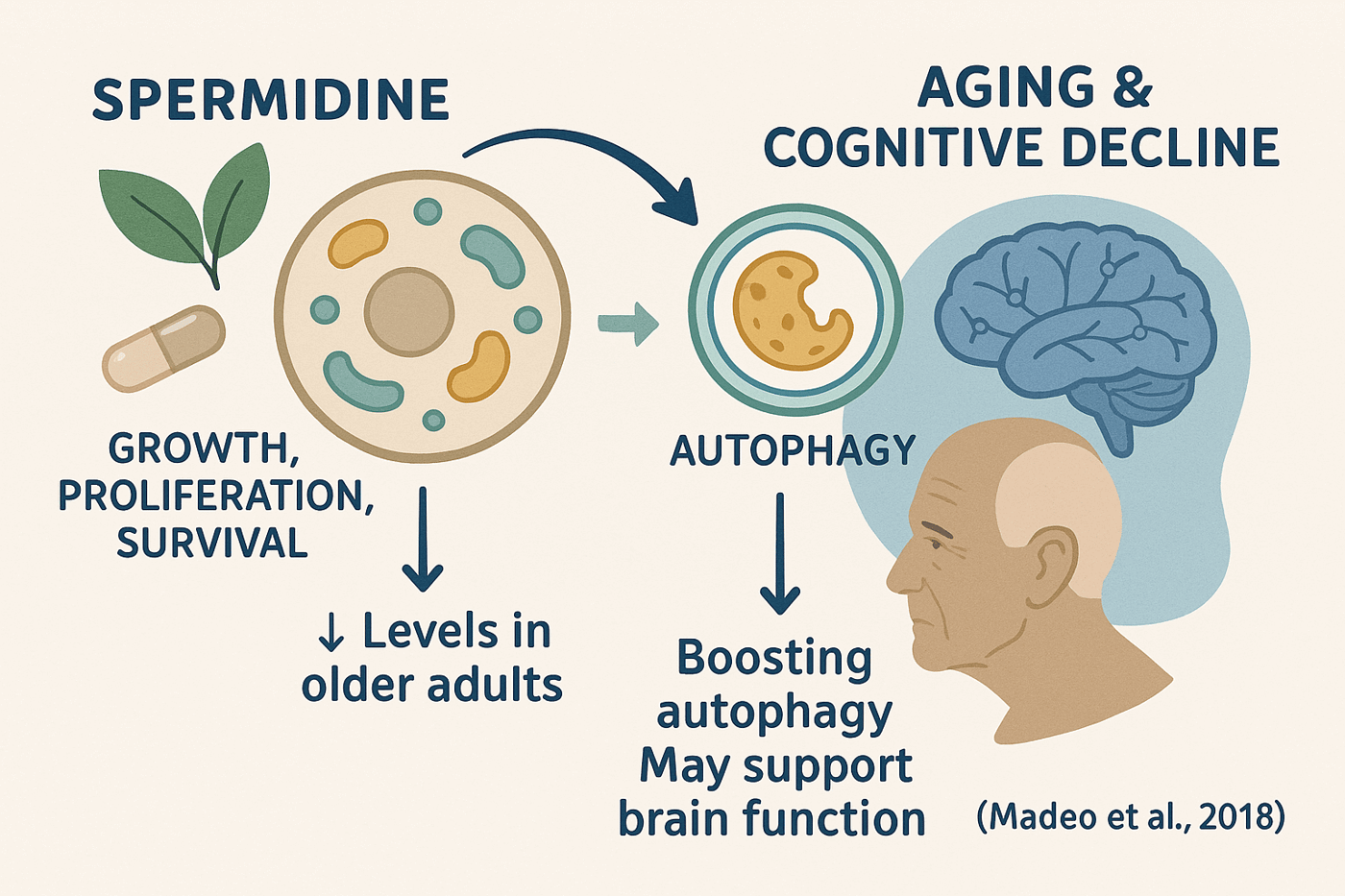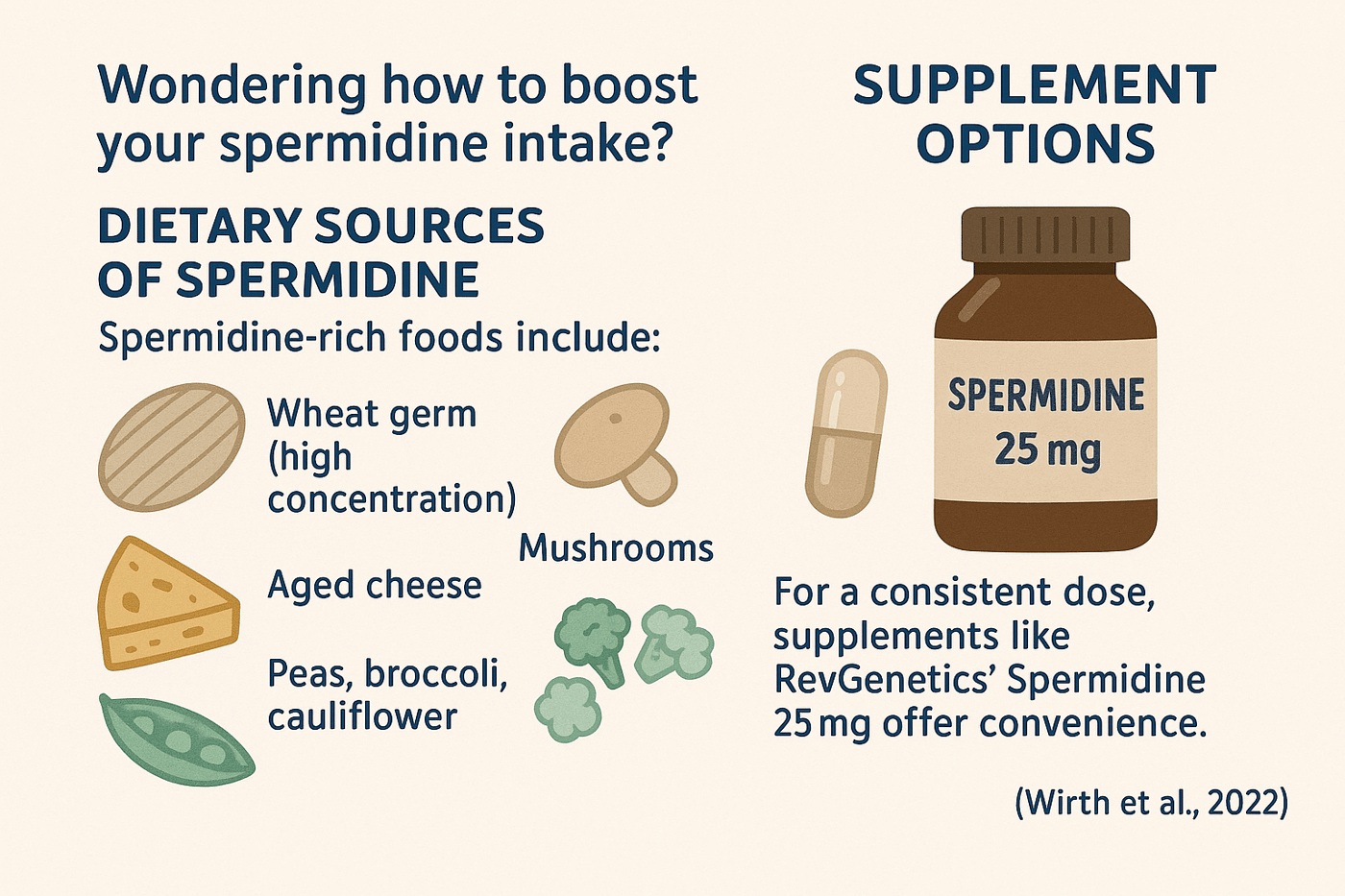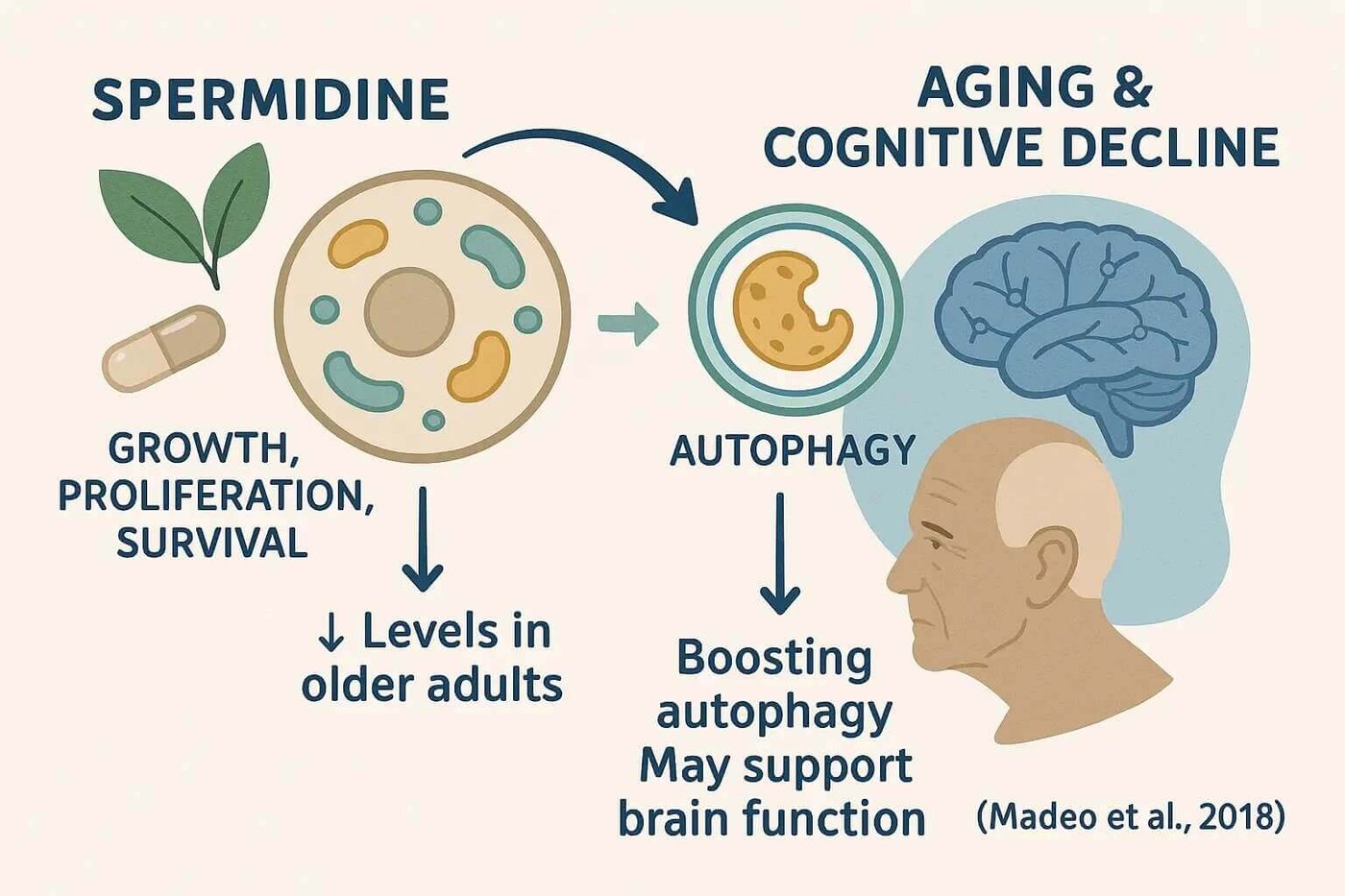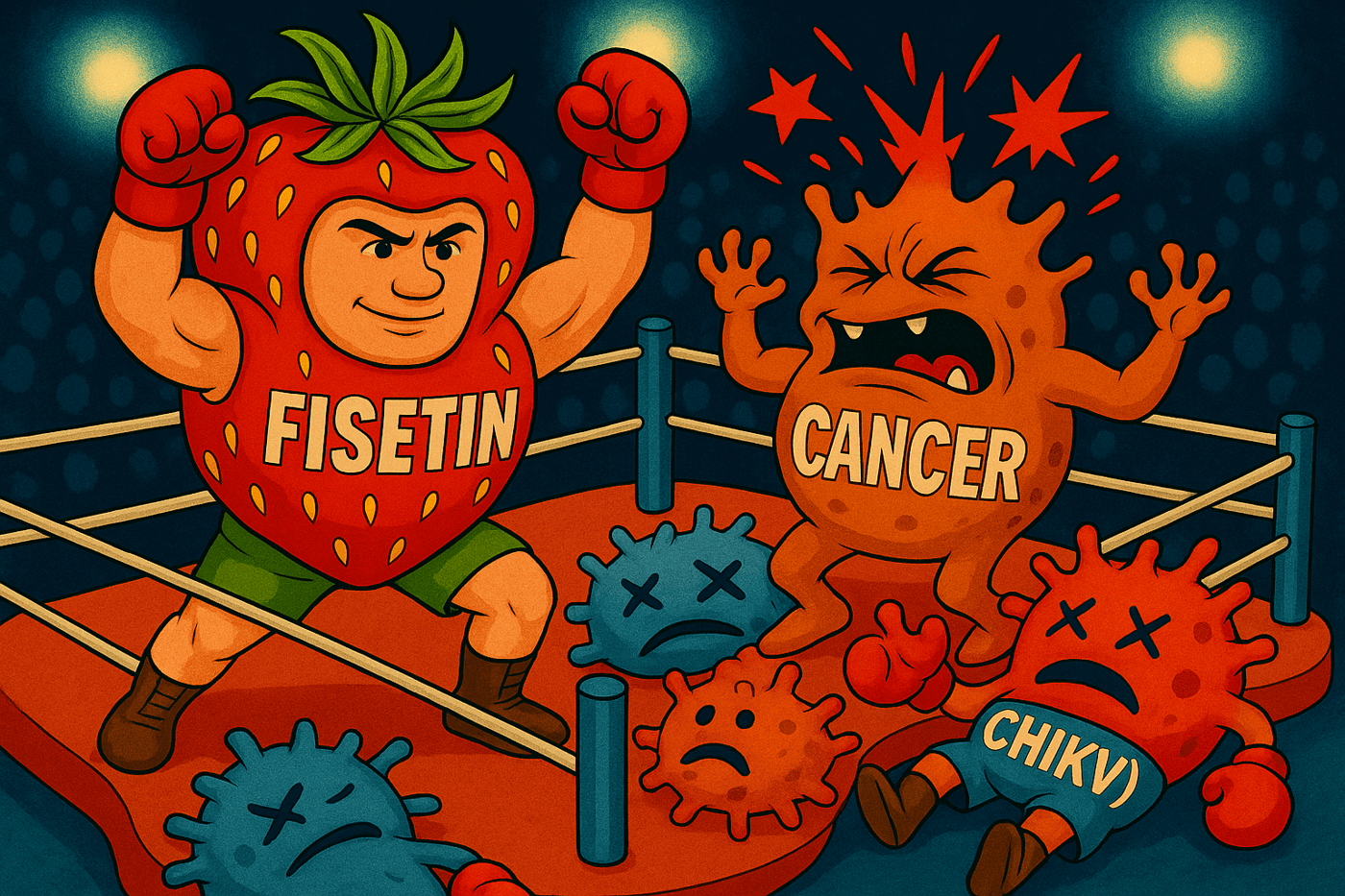Spermidine Can Protect Your Brain from Age-Related Decline: Complete Scientific Guide
By Anthony Loera | April 6, 2025
If you're concerned about maintaining sharp cognitive function as you age, spermidine emerges as a powerful natural compound that can protect your brain from age-related decline. This remarkable polyamine, found in foods like wheat germ and available through targeted supplementation, represents a breakthrough in understanding how we can actively support brain health and combat cognitive decline through cellular renewal and neuroprotection.
The science behind spermidine reveals its unique ability to trigger autophagy, reduce neuroinflammation, and enhance mitochondrial function in brain cells. These mechanisms work together to create a comprehensive defense system against the cellular damage that accumulates with aging, offering hope for preserving memory, cognitive function, and mental clarity throughout your lifespan.
Table of Contents
- Introduction to Spermidine and Brain Health
- What is Spermidine and Why It Matters for Your Brain
- The Science Behind Spermidine and Brain Protection
- Key Study: Spermidine in Vascular Dementia
- Other Health Benefits of Spermidine
- How to Get More Spermidine: Diet and Supplements
- Final Thoughts on Spermidine and Brain Health
Understanding Spermidine's Role in Brain Health Protection
As we navigate the aging process, maintaining cognitive sharpness becomes increasingly important for preserving independence and quality of life. The challenges of memory lapses, slower processing speed, and cognitive decline can significantly impact daily functioning and overall well-being. Fortunately, spermidine has emerged as a promising natural solution for protecting brain health against age-related deterioration.
This naturally occurring polyamine addresses the root causes of cognitive decline by targeting cellular dysfunction that accumulates with age. The buildup of damaged proteins, chronic inflammation, and impaired cellular energy production all contribute to brain aging. Spermidine works at the cellular level to counteract these processes, offering a proactive approach to maintaining cognitive health.
Why Brain Protection Matters More Than Ever
With increasing lifespans, the importance of preserving cognitive function throughout extended years becomes paramount. Age-related cognitive decline affects millions of people worldwide, impacting not only individuals but also their families and healthcare systems. Understanding how spermidine can protect against these changes provides hope for maintaining mental acuity and independence well into advanced age.
The compound's ability to enhance cellular cleanup mechanisms, reduce inflammation, and support brain energy production makes it a comprehensive tool for cognitive protection that goes beyond symptomatic treatment to address underlying causes of brain aging.
What Is Spermidine and Why It Matters for Your Brain

Spermidine is a naturally occurring polyamine that plays essential roles in cellular growth, proliferation, and survival across all living organisms. This remarkable compound is particularly critical for maintaining healthy brain function because it directly influences autophagy, the cellular housekeeping process that removes damaged components and recycles cellular materials.
The significance of spermidine for brain health becomes especially apparent when we understand how autophagy declines with age. As we get older, our cells become less efficient at clearing out damaged proteins, organelles, and other cellular debris. This accumulation of cellular waste contributes significantly to the cognitive decline and neurodegenerative processes associated with aging.
The Autophagy Connection
Autophagy, literally meaning "self-eating," is one of the most important cellular maintenance processes for brain health. During autophagy, cells identify and eliminate damaged components while recycling useful materials for energy and new cellular structures. This process is particularly crucial in brain cells, which have limited regenerative capacity compared to other body tissues.
Research demonstrates that spermidine levels naturally decline as we age, corresponding with reduced autophagy efficiency. This correlation suggests that maintaining adequate spermidine levels could help preserve the cellular cleanup mechanisms essential for preventing cognitive decline and supporting long-term brain health.
Spermidine's Unique Properties
What makes spermidine particularly valuable for brain protection is its ability to cross the blood-brain barrier and directly influence neural tissue. Unlike many other compounds that show promise for brain health, spermidine can effectively reach brain cells where it can exert its protective effects.
The compound's polyamine structure allows it to interact with various cellular components, including DNA, RNA, and proteins, enabling it to influence multiple aspects of cellular function simultaneously. This broad spectrum of activity makes spermidine a powerful tool for comprehensive brain protection.
The Science Behind Spermidine and Brain Protection
Understanding how spermidine protects the brain requires examining its multiple mechanisms of action that work synergistically to support cognitive health and prevent age-related decline.
Autophagy Induction: Cellular Renewal for Brain Health
The primary mechanism through which spermidine protects brain health is by inducing autophagy. This cellular renewal process becomes increasingly important with age as the accumulation of damaged proteins and organelles contributes to neurodegeneration and cognitive decline.
Spermidine activates autophagy by influencing key cellular pathways, including the mTOR (mechanistic target of rapamycin) pathway and AMPK (AMP-activated protein kinase) signaling. These pathways regulate cellular energy status and growth, and their modulation by spermidine helps cells prioritize maintenance and repair over growth when resources are limited.
Research shows that enhanced autophagy through spermidine supplementation can help clear toxic protein aggregates associated with neurodegenerative diseases, including the amyloid plaques linked to Alzheimer's disease and the tau tangles found in various forms of dementia.
Anti-Inflammatory Effects in Neural Tissue
Chronic inflammation in the brain, known as neuroinflammation, represents a major contributor to cognitive decline and neurodegenerative diseases. Spermidine demonstrates powerful anti-inflammatory properties that help calm overactive immune responses in brain tissue.
The compound works by modulating microglial cells, the brain's resident immune cells that can become hyperactivated with age. When microglia become chronically activated, they release inflammatory molecules that damage neurons and impair cognitive function. Spermidine helps restore microglial balance, reducing harmful inflammation while preserving beneficial immune responses.
This anti-inflammatory action extends beyond just calming immune responses. Spermidine also helps maintain the integrity of the blood-brain barrier, which can become more permeable with age and inflammation, allowing harmful substances to enter brain tissue.
Mitochondrial Support and Energy Production
Brain cells have exceptionally high energy demands, making mitochondrial health crucial for cognitive function. These cellular powerhouses generate the ATP that fuels neural activity, and their dysfunction contributes significantly to brain aging and cognitive decline.
Spermidine supports mitochondrial health through multiple pathways. It helps maintain mitochondrial membrane integrity, supports the expression of genes involved in mitochondrial biogenesis, and enhances the efficiency of cellular respiration. These effects combine to ensure that brain cells have the energy they need for optimal function.
Research indicates that spermidine can also promote mitophagy, a specialized form of autophagy that specifically targets damaged mitochondria for removal. This selective clearance of dysfunctional mitochondria helps maintain a healthy population of energy-producing organelles in brain cells.
Breakthrough Research: Spermidine in Vascular Dementia
One of the most compelling pieces of evidence for spermidine's brain-protective effects comes from recent research on vascular dementia, the second most common form of dementia after Alzheimer's disease. A groundbreaking 2025 study by Zhao and colleagues provides significant insights into how spermidine can protect against this devastating condition.
Study Design and Methodology
The research, titled "Spermidine attenuates microglial activation, neuroinflammation, and neuronal injury in a rat model of vascular dementia," was published in the prestigious journal Neuroscience. The study used a well-established animal model of vascular dementia to examine spermidine's protective effects.
Researchers induced vascular dementia in laboratory rats through procedures that mimic the blood flow disruptions that cause this condition in humans. They then treated groups of animals with spermidine while monitoring cognitive function, brain inflammation, and neuronal health.
Remarkable Cognitive Improvements
The results of the study were striking. Animals treated with spermidine showed significant improvements in cognitive performance across multiple measures:
- Enhanced memory function - Improved performance on tasks requiring both short-term and long-term memory
- Better learning ability - Faster acquisition of new skills and information
- Improved spatial navigation - Better performance on maze-learning tasks that require spatial memory
- Enhanced executive function - Improved decision-making and problem-solving abilities
These cognitive improvements were accompanied by measurable changes in brain tissue that help explain the mechanisms behind spermidine's protective effects.
Reduced Neuroinflammation and Microglial Activation
One of the most significant findings was spermidine's ability to reduce microglial activation and neuroinflammation. The study showed that spermidine treatment significantly decreased the activation of microglia, the brain's immune cells that become overactive in vascular dementia.
This reduction in microglial activation was associated with decreased production of inflammatory molecules that contribute to neuronal damage. The anti-inflammatory effects extended throughout brain regions affected by vascular dementia, suggesting that spermidine provides broad neuroprotective benefits.
Direct Neuronal Protection
Beyond reducing inflammation, the study demonstrated that spermidine directly protects neurons from damage. Microscopic examination of brain tissue revealed that animals treated with spermidine had significantly less neuronal injury and better preservation of brain structure.
This neuroprotective effect appeared to work through multiple mechanisms, including enhanced cellular repair processes, improved stress resistance, and reduced oxidative damage. The combination of these effects helps maintain the structural integrity of brain circuits essential for cognitive function.
Comprehensive Health Benefits Beyond Brain Protection
While brain protection represents one of spermidine's most exciting applications, research reveals that this versatile compound provides benefits across multiple body systems, supporting overall health and longevity.
Longevity and Lifespan Extension
Animal studies consistently demonstrate that spermidine supplementation can extend lifespan through its effects on autophagy and cellular maintenance. These longevity benefits appear to result from improved cellular housekeeping that reduces the accumulation of age-related damage throughout the body.
The lifespan extension observed in animal models suggests that spermidine's benefits extend beyond specific organ systems to influence fundamental aging processes. This systemic anti-aging effect makes spermidine particularly valuable for comprehensive health optimization.
Cardiovascular Health Support
Research indicates that spermidine provides significant cardiovascular benefits that complement its brain-protective effects. The compound helps reduce oxidative stress in blood vessels, improves endothelial function, and supports healthy blood pressure regulation.
These cardiovascular benefits are particularly relevant for brain health because adequate blood flow is essential for cognitive function. By supporting both cardiovascular and neurological health, spermidine provides comprehensive protection against vascular contributions to cognitive decline.
Immune System Enhancement
Spermidine supports immune system function by enhancing the body's ability to respond to infections and diseases while preventing excessive inflammatory responses that can damage healthy tissue. This balanced immune support is crucial for maintaining health throughout the aging process.
The compound's effects on immune function include supporting T-cell function, enhancing vaccine responses, and maintaining immune system adaptability. These benefits help explain why spermidine supplementation is associated with improved overall health outcomes in aging populations.
Metabolic Health and Energy Production
Beyond its direct effects on brain cells, spermidine supports metabolic health throughout the body. The compound enhances mitochondrial function in various tissues, improving energy production and metabolic efficiency.
These metabolic benefits contribute to better physical performance, reduced fatigue, and improved resilience to stress. Enhanced metabolic function also supports brain health by ensuring adequate energy supply for cognitive processes.
How to Optimize Your Spermidine Intake: Diet and Supplements

Understanding how to effectively increase your spermidine intake is crucial for accessing its brain-protective benefits. Both dietary sources and supplements offer viable options, each with distinct advantages and considerations.
Rich Dietary Sources of Spermidine
Natural food sources provide an excellent foundation for increasing spermidine intake while offering additional nutrients that support brain health:
High-Concentration Sources
- Wheat germ - Contains the highest natural concentrations of spermidine, making it an excellent dietary addition
- Aged cheeses - Particularly aged cheddar and other fermented dairy products
- Soybeans and soy products - Including tempeh, miso, and fermented soy foods
- Mushrooms - Especially shiitake and other umami-rich varieties
Moderate Sources for Regular Consumption
- Cruciferous vegetables - Broccoli, cauliflower, and Brussels sprouts
- Green peas and legumes - Providing both spermidine and protein
- Nuts and seeds - Particularly pumpkin seeds and sunflower seeds
- Whole grains - Brown rice, quinoa, and other unprocessed grains
Optimizing Dietary Intake
To maximize spermidine intake from food sources, consider incorporating multiple spermidine-rich foods into your daily diet. A breakfast that includes wheat germ, a lunch with legumes and vegetables, and dinner featuring mushrooms and whole grains can significantly boost your daily spermidine consumption.
However, it's important to note that spermidine content in foods can vary based on factors such as processing methods, storage conditions, and preparation techniques. Additionally, natural spermidine production in the body declines with age, making dietary intake alone potentially insufficient for optimal brain protection.
Strategic Supplementation for Optimal Benefits
For consistent and measurable spermidine intake, high-quality supplements offer several advantages over dietary sources alone. Supplements provide standardized dosing, eliminate variability in food sources, and can deliver higher concentrations than typically achievable through diet alone.
Choosing Quality Supplements
When selecting spermidine supplements, look for products that provide clear labeling of spermidine content, third-party testing for purity, and appropriate dosing based on current research. Quality manufacturers like RevGenetics offer spermidine supplements with 25mg per serving, providing a research-backed dose for brain health support.
Dosage Considerations
Current research suggests that effective doses for brain protection may be higher than those used in some early studies. While the SmartAge trial used 0.9mg per day with mixed results, emerging research indicates that doses in the 10-25mg range may be more effective for cognitive benefits.
It's essential to start with lower doses and gradually increase while monitoring for any side effects. Consulting with a healthcare provider familiar with spermidine research can help determine the optimal dosage for your individual needs and health status.
Maximizing Absorption and Effectiveness
To optimize spermidine's brain-protective effects, consider factors that influence absorption and utilization:
- Timing - Taking spermidine with meals may enhance absorption and reduce potential digestive upset
- Consistency - Regular daily intake appears more beneficial than intermittent dosing
- Lifestyle factors - Combining spermidine with exercise and healthy sleep patterns may enhance its neuroprotective effects
- Complementary nutrients - Antioxidants and omega-3 fatty acids may work synergistically with spermidine for brain health
Clinical Evidence and Human Studies
While animal research provides compelling evidence for spermidine's brain-protective effects, understanding the current state of human clinical trials is crucial for realistic expectations about its benefits.
The SmartAge Clinical Trial
The SmartAge study represents one of the most significant human clinical trials examining spermidine's effects on cognitive function. This randomized, placebo-controlled trial investigated whether spermidine supplementation could improve cognitive performance in older adults with subjective cognitive decline.
Participants received 0.9mg of spermidine daily for 12 months, with researchers monitoring various cognitive measures including memory, attention, and executive function. While the results showed some improvements in specific cognitive domains, the effects were modest compared to the dramatic benefits observed in animal studies.
Interpreting Mixed Results
The relatively modest effects observed in the SmartAge trial may reflect several factors:
- Dosage considerations - The 0.9mg daily dose may be insufficient for significant cognitive benefits
- Study duration - Longer intervention periods might be necessary to observe substantial effects
- Population selection - Benefits may be more pronounced in individuals with existing cognitive impairment
- Individual variability - Genetic factors may influence individual responses to spermidine supplementation
Emerging Research Directions
Current research is exploring higher doses, longer intervention periods, and more targeted populations to better understand spermidine's potential for human cognitive enhancement. Studies examining doses in the 10-25mg range are showing more promising preliminary results.
Additionally, researchers are investigating combination approaches that pair spermidine with other neuroprotective compounds to enhance its brain-protective effects.
Safety Considerations and Potential Side Effects
Understanding the safety profile of spermidine is essential for making informed decisions about supplementation for brain protection.
General Safety Profile
Spermidine has an excellent overall safety profile based on decades of research. As a naturally occurring compound found in many common foods, spermidine is generally well-tolerated by most individuals.
The compound's safety is further supported by its presence in the human body, where it plays essential roles in cellular function. This endogenous production and utilization suggest that external supplementation is unlikely to cause significant adverse effects when used appropriately.
Potential Side Effects
While serious side effects are rare, some individuals may experience mild digestive upset, particularly when starting supplementation or using higher doses. These effects typically resolve as the body adjusts to supplementation.
Other potential considerations include:
- Interactions with certain medications
- Individual sensitivity variations
- Effects during pregnancy and breastfeeding (safety data limited)
Precautions and Contraindications
Individuals with certain health conditions should exercise caution with spermidine supplementation. Those taking medications for blood pressure, diabetes, or other chronic conditions should consult healthcare providers before beginning supplementation.
Additionally, individuals with a history of cancer should discuss spermidine use with their oncologists, as the compound's effects on cell growth pathways require careful consideration in these contexts.
Frequently Asked Questions About Spermidine and Brain Protection
What is spermidine and how does it protect the brain?
Spermidine is a naturally occurring polyamine that protects the brain through three main mechanisms: inducing autophagy (cellular cleanup), reducing neuroinflammation, and supporting mitochondrial energy production. It helps remove toxic proteins like those associated with Alzheimer's disease, calms overactive immune cells in the brain, and maintains cellular energy essential for cognitive function, making it highly effective against age-related cognitive decline.
How does spermidine benefit brain health and cognitive function?
Spermidine benefits brain health by enhancing cellular cleanup processes that remove damaged proteins, reducing chronic brain inflammation that contributes to cognitive decline, and supporting mitochondrial energy production crucial for neural activity. Research demonstrates improvements in memory formation, learning ability, spatial navigation, and overall cognitive performance while protecting against various age-related brain conditions.
Can spermidine prevent or delay cognitive decline with aging?
Research strongly suggests that spermidine can help prevent and delay cognitive decline associated with aging. Animal studies consistently show significant improvements in memory and reduced dementia symptoms. A groundbreaking 2025 study demonstrated spermidine's protection against vascular dementia by reducing neuroinflammation and preventing neuronal damage, while human studies show more modest but encouraging cognitive benefits.
What foods contain spermidine for brain health?
The richest dietary sources of spermidine include wheat germ (the highest natural concentration), aged cheeses, soybeans and fermented soy products, mushrooms (especially shiitake), broccoli, cauliflower, green peas, nuts, seeds, and whole grains. Incorporating multiple spermidine-rich foods into your daily diet can help support brain health, though targeted supplementation may be necessary for optimal therapeutic doses.
What is the optimal spermidine dosage for brain protection?
While the SmartAge clinical trial used 0.9mg daily with modest results, emerging research suggests that doses in the 10-25mg range may be more effective for significant brain protection benefits. Quality supplements like those from RevGenetics offer 25mg doses based on current research findings. It's recommended to start with lower doses and gradually increase while consulting a healthcare provider to determine optimal dosing for individual needs.
Is spermidine safe for long-term brain health supplementation?
Spermidine has an excellent safety profile as a naturally occurring compound found in common foods and produced by the human body. Most people tolerate spermidine supplementation very well, though some may experience







